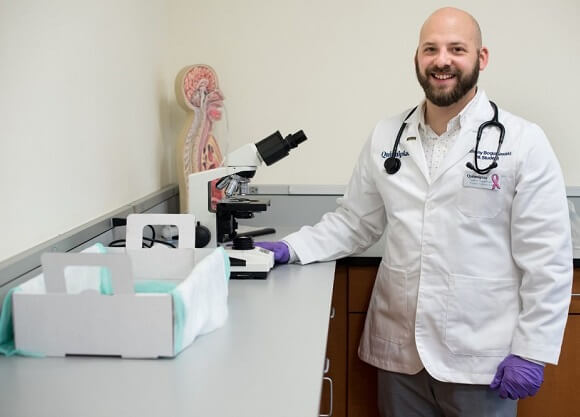
Physician assistant graduate driven by desire to help others
July 05, 2018

July 05, 2018

Inspired by stories of his grandfather, a Polish WWII veteran who survived internment at Auschwitz, Boguslawski enlisted in the U.S. Army and was deployed to Iraq in 2009. An infantry platoon leader, he led 40 soldiers at a small outpost in the remote town of Mahmoudiyah, from which he planned and coordinated all of his team’s missions.
“I was essentially responsible for the health, safety, professional development and preparedness of my platoon,” Boguslawski said.
One day, while observing his platoon’s medic providing Iraqi civilians with rudimentary health care services, something clicked for the young Army officer.
“I realized then how the seemingly simple medical treatments that are often taken for granted can be incredibly significant, especially for the underprivileged,” Boguslawski said.
Providing these services enabled Boguslawski and his platoon to build a strong rapport with the local residents. The experience spurred him to pursue a career in health care following his deployment, specifically as a physician assistant.
“I knew that being a PA would be the best fit because it would allow me to practice medicine with some autonomy, as well as afford me leadership opportunities in health care,” Boguslawski said.
After completing the Warrior-Scholar Project, a program that helps transitioning veterans prepare for higher education, Boguslawski began his search for the right PA program. He already knew of Quinnipiac’s Top 5 national rank, as well as its high graduate pass rate on the Physician Assistant National Certifying exam. However, it was the support he received from Quinnipiac’s Office of Veteran and Military Affairs, specifically from its director, Jason Burke, that made his decision to attend Quinnipiac an easy one.
Burke provided Boguslawski with information regarding veteran scholarships, as well as the resources available for veterans in Quinnipiac’s programs and within its facilities.
“It is clear that Jason cares and has a passion for assisting transitioning vets,” Boguslawski said. Quinnipiac also was recognized as the top military-friendly school in the United States by the Military Friendly Survey, which reviews college and university efforts to serve military and veteran students.
What differentiated Quinnipiac’s PA program further for Boguslawski was something any veteran and former platoon leader would value highly: a close-knit community anchored by strong, accessible leadership. Being able to learn under William Kohlhepp, dean of the School of Health Sciences, was a particularly formative experience.
“He has had a significant impact on the profession and its national advancement,” Boguslawski said. “His years of experience alone were enough to make his instruction invaluable.”
Looking back on his experience in the program, Boguslawski is humble and grateful for the sheer depth of knowledge, skill and confidence it has given him. His numerous rotations exposed him to specialties ranging from primary care, pediatrics and psychiatry to general surgery — the one he hopes to work in. Perhaps the most inspiring subject Boguslawski tackled, however, was Advanced Cardiac Life Support, a certification course focused on life-saving practices and techniques.
“This one brought it all into perspective for me,” he said. “The stark realization that we will be using these skills to treat life-threatening conditions motivates me to pursue as much knowledge as possible to best serve my patients.”
Quinnipiac Today is your source for what's happening throughout #BobcatNation. Sign up for our weekly email newsletter to be among the first to know about news, events and members of our Bobcat family who are making a positive difference in our world.
Sign Up Now